选修六unit5语法教案
人教版高中英语选修六:Unit+5+教案+
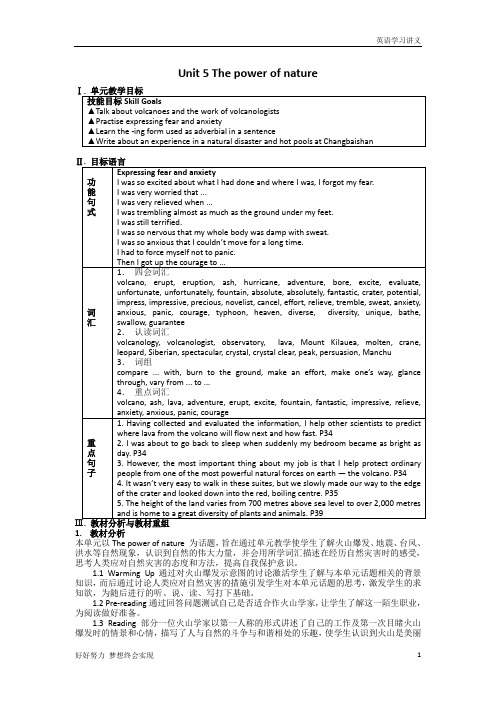
Unit 5 The power of nature1.教材分析本单元以The power of nature 为话题,旨在通过单元教学使学生了解火山爆发、地震、台风、洪水等自然现象,认识到自然的伟大力量,并会用所学词汇描述在经历自然灾害时的感受,思考人类应对自然灾害的态度和方法,提高自我保护意识。
1.1 Warming Up通过对火山爆发示意图的讨论激活学生了解与本单元话题相关的背景知识,而后通过讨论人类应对自然灾害的措施引发学生对本单元话题的思考,激发学生的求知欲,为随后进行的听、说、读、写打下基础。
1.2 Pre-reading通过回答问题测试自己是否适合作火山学家,让学生了解这一陌生职业,为阅读做好准备。
1.3 Reading部分一位火山学家以第一人称的形式讲述了自己的工作及第一次目睹火山爆发时的情景和心情,描写了人与自然的斗争与和谐相处的乐趣,使学生认识到火山是美丽的,但同时极具破坏力,而火山学家的工作可以减少由火山引发的损失。
1.4 Comprehending设计了两种题型:第一题要求学生在阅读后回答相关问题;第二题检测学生对文章细节的理解。
1.5 Learning about Language 分为词汇和语法两部分。
词汇部分着重从词的意义用法和表达方面对学生学习词汇给予指导;语法部分学习ing 形式在句子中作状语表示时间、原因及结果。
1.6 Using Language以语言实践为目的,包括四个部分的内容。
Listening and speaking 三位火山学家讲述了他们各自最惊险的一次经历。
学生在练习听力的同时学会描述害怕和紧张的词汇。
Speaking 是Listening的延续。
要求学生讲述自己类似的经历,同时在运用中巩固单词。
Reading 介绍了旅游胜地The Lake of Heaven, 培养学生快速获取信息的能力。
Writing 与Reading 属于同一话题,要求根据所给信息写一篇介绍Hot springs的作文。
人教版高中英语选修6 Unit5 语言点名师教学设计

1.通过从字词句大量输入,学生 能掌握更多知识点及用法
(20 make/have an appointment with sb. 与某人约会 mins ) keep /break one’s appointment 守约/违约;失约
The teacher appointed him (to be) monitor. 老师任命他为班长。
Unit5 语言点名师教学设计 Book6 Unit 5: The Power of Nature Section 2 语言知识点课框架单 教材版本:人教版册数:Book 6 单元:Unit5 课型(课时):语本单元的话题词汇,词汇部分着重从词的意义用法和表达方面对学生学习词汇给予指导,一共设计了四环节,帮助 学生理解并运用课文中的新词汇。环节一是词语英英释义(paraphrase)练习。环节二是对阅读课中的重难点词汇的详解。环节三是短 文填空,要求学生用课文中出现的词填空。环节四是小组游戏活动,根据提供的中心词汇,用一个句子描述一种灾难。
目的
1. 通过派生词汇的操练, 拓展学 生词汇量并有效记忆本单元单 词。 Suggested answers: 1. eruption 5. anxiety 7. bath excitement 2. comparison 6. diverse 8. exciting excited 3. adventurous 4. evaluation
Section 2 语言知识点课教学设计
步骤
DELC 1 预备 与激 活先 期知 识
过程
Step 1 Revisio n and Leading -in ( 引 入 )(3mi ns )
措施(教师活动与学生活动)
1.Revision and leading in 1. erupt v.→______________n. 爆发 2. compare v.→____________n.比较;对比 3. adventure n.→__________adj. 有冒险精神的 4. evaluate v.→____________n. 评价; 5. anxious adj.→____________n.焦虑;忧虑 6. diversity n.差异性;不同点→___________adj.多种多样的;不同的 7. bathe vt.给…洗澡→_______n. 沐浴;浴室/盆 8.excite v.使…兴奋/激动→_________ adj.令人兴奋的→_______adj.兴奋的 →__________n.兴奋, 刺激
高中英语人教版选修6Unit5thepowerofnaturereading教案(系列五)
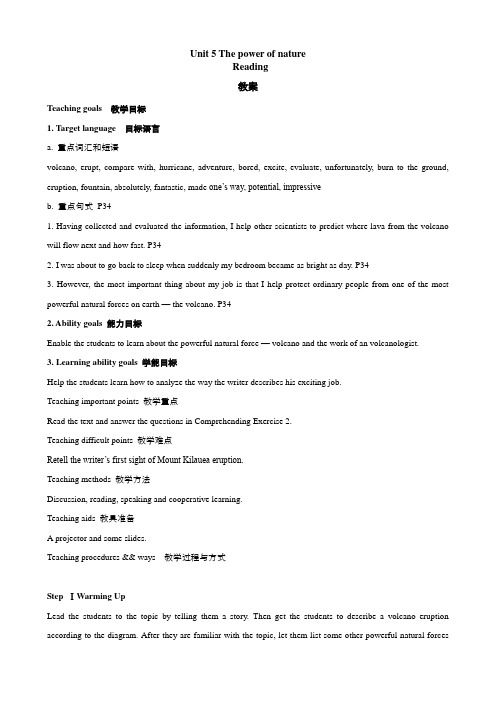
Unit 5 The power of natureReading教案Teaching goals 教学目标1. Target language 目标语言a. 重点词汇和短语volcano, erupt, compare with, hurricane, adventure, bored, excite, evaluate, unfortunately, burn to the ground, eruption, fountain, absolutely, fantastic, made one’s way, potential, impressiveb. 重点句式P341. Having collected and evaluated the information, I help other scientists to predict where lava from the volcano will flow next and how fast. P342. I was about to go back to sleep when suddenly my bedroom became as bright as day. P343. However, the most important thing about my job is that I help protect ordinary people from one of the most powerful natural forces on earth — the volcano. P342. Ability goals 能力目标Enable the students to learn about the powerful natural force — volcano and the work of an volcanologist.3. Learning ability goals 学能目标Help the students learn how to analyze the way the writer describes his exciting job.Teaching important points 教学重点Read the text and answer the questions in Comprehending Exercise 2.Teaching difficult points 教学难点Retell the writer’s first sight of Mount Kilauea eruption.Teaching methods 教学方法Discussion, reading, speaking and cooperative learning.Teaching aids 教具准备A projector and some slides.Teaching procedures && ways 教学过程与方式Step ⅠWarming UpLead the students to the topic by telling them a story. Then get the students to describe a volcano eruption according to the diagram. After they are familiar with the topic, let them list some other powerful natural forcesand discuss the ways human beings protect themselves from the natural forces.T: Listen to me carefully. I will tell you a story about a strange city. The strange city named Pompeii is a dead city. No one has lived there for nearly two thousand years, yet every year thousands of people travel from distant countries to visit it. It died suddenly in a terrible rain of fire and ash. Tons of hot ash fell on Pompeii, hiding it from sight. For three days the sun didn’t break through the clouds of ash in the sk y. Then the whole city shook and buildings fell down. When everything was calm, Pompeii was buried deep. A city disappeared and people there lost their lives too. Can you guess what had happened to the city?S1: There must have been a terrible earthquake. After the terrible quake, everything was destroyed.T: Yes. It’s one kind of the causes. Any different ideas?S2: Maybe a volcano erupted and a terrible rain of fire and ash fell on the city.T: You got it! Mount Vesuvius, which had slept quietly for centuries, erupted suddenly. It destroyed the city Pompeii. How terrible! Have you ever seen a volcano erupting? Please turn to page 33. Look at the diagram. Describe a volcano erupting using the diagram and the given words.S3: When boiling rock erupts from the volcano, the red hot lava rushes hundreds of metres into the air and a cloud of ash goes straight up into the air. Ash cloud forms. Rocks, fire, ash fall onto the ground. The lava flows slowly down the mountain. It buries everything in its path under the molten rock.S4: Sometimes, volcano erupting can cause some other disasters like earthquakes, fire and ground sea.T: How powerful the nature is! The lava can buries everything in its path. A volcano erupting can damage a city. A flood can carry everything in its path, while a fire will damage everything it meets. It seems that we human beings are powerless in front of these natural forces. What can we do to protect ourselves from powerful natural forces? Please work in groups of four to list some other natural forces and discuss the ways that human beings protect ourselves.A few minutes later.T: Who would like to share your opinion with the class?S5: I’d like to talk about volcano. Sometimes, the volcano gives warnings in the form of many small earthq uakes. And scientists can provide warnings of possible volcano explosions with the help of equipment. So the government can help people who live near the volcano leave their homes before erupting.S6: We are more familiar with fire. In fact, it can be avoided most of the time, if we are careful in our daily life. I know a way of controlling the fire. Firefighters burn the trees which are in the path of the fire, so there is nothing to burn when the fire arrives.S7: Flood always happens in the south of our country. Predication is very important. Scientist keep observing thelevel of the water during the summer. People strengthen the bank and move to higher land.S8: We have learned more about earthquakes. People have learned many ways to protect themselves. For example, earthquake happens, if you are in bed, stay where you are and protect your head with a pillow. If you are outdoors, find a clear spot away from buildings, trees and streetlights.S9: I think the best way is to move to a safer place where fire, earthquake, flood and hurricane will never happen.Step ⅡPre-readingGet the students to answer the six questions on page 33 to find out whether they will enjoy working as a volcanologist. And then get them to talk about the occupation according to the questions.T: I see. Prediction is very important. We can say scientists play an important part in protecting people from natural forces. Would you like to study volcanoes? And do you want to be a volcanologist?Ss: Yes.T: Let’s test whether you are suitable for this job or not. Answer “yes” or “no” to these que stions on page 33.The students answer the questions to see if they are suitable to be a volcanologist.T: Are you suitable for the job? Who can tell us what kind of person can be a volcanologist?S1: First he must be brave enough because he must climb into a live volcano to take the temperature of the boiling rock inside.S2: I think interest is the most important. He should show great interest in studying rocks and volcanoes.S3: He should be interested in travelling to unusual places and like adventure in his life.S4: If you want to be a volcanologist, you should enjoy working outside because a lot of work need to be done outdoors.Step ⅢWhile-readingScanningGet the students to read the passage quickly and accurately. Give them a couple of minutes to look through the whole passage. Tell them to read the text silently and then ask them some detailed questions about the text.T: What do es a volcanologist do? Is the work interesting? Let’s read a passage written by a volcanologist. The volcanologist enjoys his job very much. He described his exciting job. And he wrote down his first sight of an eruption. Now let’s read the text quickly an d find out the answers to these questions Comprehending Exercise 1 on page 35 .Several minutes later.Check the answer..SkimmingIn this part, the students will read the text quickly to get the general idea of the passage. Check the answers with the whole class, then explain some sentences or words that the students may find hard to understand.T: Now please read the text again and try to get the main idea of the passage in groups of four.Three or four minutes later.T: Have you got the general idea of the text?It wasn’t very easy to walk in these clothes, and we slowly made our way to the edge of the crater and looked down into the red, boiling center. Though I was a little afraid, I wanted to climb down into the crater to collect some lava. But this being my first experience, I could only stayed at the top and watched the two scientists. At that time I determined to be a volcanologist forever.DiscussionT: In the writer’s opinion, his job is the greatest one. Do you like this occupation? Why or why not? Discuss in groups of four.S2: I would not like to be a volcanologist. I prefer to work in an office to do some research work. It’s a waste of time and energy to spend so much time traveling.S3: I hope to be a vocanologist. You’ll be proud of yourse lf when people escape before volcano erupting because of your work. Also, I am interested in the rocks and other things that make up the surface of the earth. I want to know the secret of the earth.S4: It is not my ideal occupation. I like traveling to unusual places, studying different cultures, talking with interesting people and collecting interesting things. But I’m not brave enough to climb into a live volcano to take the temperature of the boiling rock inside.S5: I don’t like this job. It’s too dang erous. If the volcano erupts suddenly when you are collecting the lava, maybe you will lose your life.T: Well, if you meet the writer, what kind of questions would you ask him?S6: Aren’t you afraid when you walk towards the volcano? It’s so hot and the v olcano may erupt again.S7: What should you do if you get lost on your way to the volcano?S8: When did you begin to be interested in volcanoes?S9: How will you escape if the volcano erupts suddenly?S10: Are there any living things in volcanoes?S11: Why do people live near the volcanoes since they may lose their homes or even lives?Writing characteristicsT: Good! If you are interested in this occupation, you can get more information on the Internet. Now who can summarize the writing style and techniques of this text?The teacher can ask the students to have a discussion in pairs or groups, and then ask some of them to show their ideas.Sample answers:This passage was written by a volcanologist. He uses the first person to describe his exciting job and his experience and express his true love for his job. The words are vivid and the description is natural, which makes the readers feel as if they were watching the volcano eruption and begin to like the occupation. For example, he uses “like a railway train passing outside my window”, “suddenly my bedroom became as bright as day” and “red hot lava was fountaining hundreds of metres into the sky” to describe the big noise and fantastic sight of volcano eruption. To tell readers that his job is intere sting, the writer uses several “sometimes”, which makes the readers feel the job is extremely interesting and want to be a vocanologist. The writer talks about the volcano objectively. He points out the damages of volcano but he praises its fantastic sight at the same time.T: What can we learn from the text?S: The key word of the text is “exciting”, which is the focus of the passage. By telling the readers his everyday work, the importance of his job, his first sight of volcano eruption and his sincere love for his job, the author proves it’s his chief enjoyment to be a volcanologist. And I appreciate the writer’s attitude towards nature. We should love nature and we can do something to minimize the damage caused by natural forces.Step ⅤHomeworkT: No w it’s time for homework. Today you have two tasks to finish after class. The first task is to finish exercises in Discovering useful words and expressions on page 35. These exercises will help you practice the words and expressions we’ve just learned. The second one is to retell the text. That’s all for today. See you tomorrow.。
人教版高中英语选修六Unit+5+The+power+of+nature+教案.doc

Unit 5 The power of nature教学目标(一)知识技能目标:学生在原有非谓语动词的知识基础上,归纳总结现在分词完成式的语法规则及其在句中的功能,并能够通过“输出”环节运用目标语言表达相关主题。
(二)过程方法目标:学生积极参加课堂活动,体现以学生为中心的课堂教学目标。
通过学生个人探究和小组合作学习让学生更好地融入课堂教学。
(三)情感态度目标:结合故事情节和教师的引导,学生能更加清楚的认识到家的重要性,认识到家是我们奋斗路上获得不竭动力的源泉。
教材分析本节课为语法课,学习非谓语动词完成式各种形式及其用法;其中包括having done, having been done及其否定式not having done的具体使用规则和在句中作状语的用法。
教师结合本单元的语料内容,整合教材中working out the rules 部分复合学生认知逻辑的学习过程,结合最新流行电影<Coco>剧情,通过故事情节语篇内容的渗透,让学生在语篇中感受该语法项目的使用,随后学生小组讨论归纳语法规则,最后辅之以控制性练习,半控制性练习及开放式练习以使其加强巩固该语法项目的掌握。
学情分析(一)本节课授课对象为高二年级学生,他们在前期学习中已经初步掌握非谓语动词的一般式在句中作主语,宾语,表语,定语,状语,补语等各类成分的使用,并能比较正确的使用以上语法项目进行写作和口语的输出。
基于这种情况,学生能够比较好的本课中继续进行同知识领域的语法项目的继续建构。
(二)高二年级的学生有比较强的好奇心,选择<Coco>电影作为整节课的语言输入和输出语境,能够比较好的激发学生的兴趣,使其更好的融入语境,从而为语言学习做好准备。
(三)学生根据课堂设计环节应能比较顺利的完成语法归纳,但其在用英文表述语法项目时可能会有困难,故而教师会从以下两方面辅助学生总结:1. 尽可能教师在此环节的语言指令,并辅之以例子,使学生明确要求;2. 在学案中给出规则表格和术语提示,从而使学生能够顺利完成任务。
高二英语人教课标选修6unit5grammar教案

教案 4 人教选修6 Unit5 The power of natureGrammarTeaching materialNSEFC Book 6 —— Unit 5Teaching aimsEnable the students to master the v-ing form used as an adverbialTeaching important &difficult pointsHow to enable the students to know v-ing form used as an adverbialTeaching aidstape recorder, slidesTeaching proceduresStep1 Lead inExamine the sentences below and tell the similarity and difference between these two sentences.Looking carefully at the ground, I made my way to the edge of the crater.Having experienced quite a few earthquakes in Hawaii already, I didn’t take my notice.The –ing form can be used as an adverbial in a sentence to give information about time, reasons or results. We use the construction having+past participle to refer to an action that took place before the time expres sed by the main verb.Grammar–ing 形式作状语一、与过去分词作状语的区别。
人教版高中英语选修6教案Unit 5 The power of nature

人教版高中英语选修6教案Unit 5 Thepower of natureUnit5Thepowerofnature一、语言要点I单元要点预览(旨在让同学整体了解本单元要点)词汇部分词语辨析1.living/alive/live2.force/power/strength词形变化 1.volcanon.火山volcanicadj.火山的volcanologyn.火山学volcanologistn.火山学家 2.eruptv.爆发eruptionn.(火山,战争)爆发3.absoluteadj.绝对的,完全的absolutelyadv.绝对地4.anxiousadj.忧虑的anxietyn.担心,焦虑5.bathev.洗澡,游泳bathn.洗澡fortv.&n.安慰;使缓和comfortableadj.舒适的uncomfortableadj.不舒服的;不舒适的重点单词1.equipmentn.装备,设备2.appointvt.约定;任命,委任3.evaluatevt.评估,评价,估计4.preciousadj.贵重的,珍贵的5.panicv.惊慌n.惊慌,恐慌6.diverseadj.多种多样的,不同的7.guaranteevt.保证,担保重点词组compare……with与……比较burntotheground全部烧毁makeone’sway前往sparenoeffort不遗余力,尽力impresssb.withsth.使某人铭记某事重点句子1.Iwasabouttogobacktosleepwhensuddenlymybedroombeca measbrightasday.2.Itissaidthatthisboy,whohadagreatg iftforlanguagesandpersuasion,isthefatherofthemanchu people.重点语法动词形式ing作状语II词语辨析1).living/alive/liveadj.活的【解释】living可作定语又可作表语;可用于指人也可用于指物,指人时可表示“健在”此时指和”死”相对的活着。
选修六unit 5句型学案
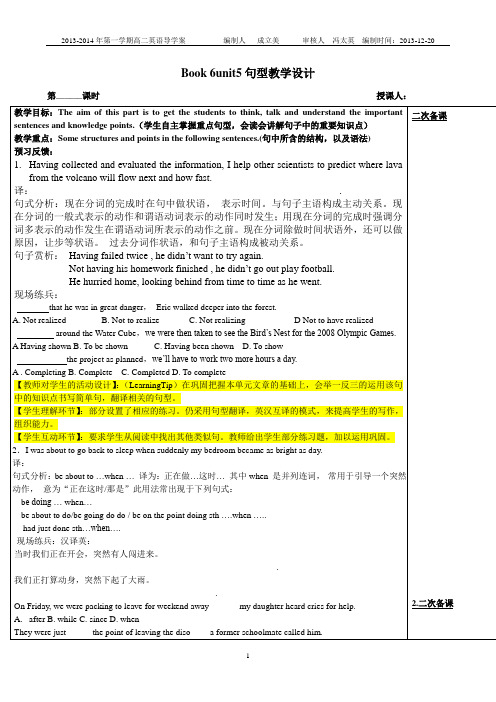
3. However weak we are, we are not completely powerless.
句式分析:however用作连词,引导让步状语从句,修饰形容词或者副词,语序为:however+adj./adv+主语+谓语;
【教师对学生的活动设计】:(LearningTip)在巩固把握本单元文章的基础上,会举一反三的运用该句中的知识点书写简单句,翻译相关的句型。
【学生理解环节】:部分设置了相应的练习。仍采用句型翻译,英汉互译的模式,来提高学生的写作,组织能力。
【学生互动环节】:要求学生从阅读中找出其他类似句。教师给出学生部分练习题,加以运用巩固。
however也可以作复词,表转折,意思是“然而,不过”
练习:_____ ______ I explained (无论我解释的多么仔细),she still didn’t understand.
We thought the figures were correct. _________(然而,不过),we have now discovered some errors.
句子赏析:Having failed twice , he didn’t want to try again.
Not having his homework finished , he didn’t go out play football.
He hurried home, looking behind from time to time as he went.
巩固训练
1.The retired man donated most of his savings to the school damaged by the earthquake in Yushu ,________the students to
选修六Unit5-教学设计

Book6 Unit 5 The power of nature教学设计1.教学目标:●To get a general idea of natural disasters●Gain some information about volcano●Grasp important words2.教学重难点:Gain some information about volcanoGrasp important words3. 教学过程:Step I Lead-inLet’s share some picturesDo you familiar with these disasters?Step ⅡSome information about colcano1. What’s happened in the picture?2. How is a volcano formed?3.Where is most possible for a volcano to erupt?4. What types of volcanoes do you know?5.Answer “yes”or“no” to the following questionsStep III Pre-reading1.What kind of things should a volcanologist do?2.What is the volcanologist wearing when getting close to the crater?Step IV SummaryDiscussion:Having learned a little more about the work of a volcanologist,1. What qualities are needed for a volcanologist?2. Are you suitable for being a volcanologist ?Step V HomeworkSurf on the internet . Try to find the answers to the following questions and writea report.1.Which volcano killed the most people ?2.How many active volcanoes are there in the world ?3.What is the biggest volcano ?4.What is the tallest volcano?教学反思整堂课上下来,比较顺畅,环节一个接一个,比较紧凑,学生配合挺好,积极性很高1。
高中英语人教版选修六Unit5 Using LanguageⅡ教案
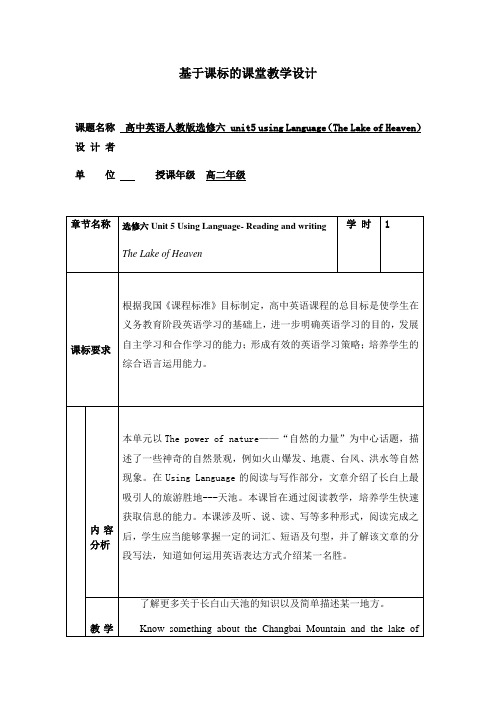
1.Help students learnsomething about tianchi on Changbai Mountain, include the location, scenery and the attraction there.
2.know how to describe a place in English
基于课标的课堂教学设计
课题名称高中英语人教版选修六 unit5 using Language(The Lake of Heaven)设计者
单位授课年级高二年级
章节名称
选修六Unit 5 Using Language- Reading and writing
The Lake of Heaven
学时
1
课标要求
2.Watching movie and enjoying the beautiful scenery of Changbai mountain and The lake of Heaven
Lead in the topic of Changbai Mountain and the lake of Heaven
根据我国《课程标准》目标制定,高中英语课程的总目标是使学生在义务教育阶段英语学习的基础上,进一步明确英语学习的目的,发展自主学习和合作学习的能力;形成有效的英语学习策略;培养学生的综合语言运用能力。
内容与学情分析
内容分析
本单元以The power of nature——“自然的力量”为中心话题,描述了一些神奇的自然景观,例如火山爆发、地震、台风、洪水等自然现象。在Using Language的阅读与写作部分,文章介绍了长白上最吸引人的旅游胜地---天池。本课旨在通过阅读教学,培养学生快速获取信息的能力。本课涉及听、说、读、写等多种形式,阅读完成之后,学生应当能够掌握一定的词汇、短语及句型,并了解该文章的分段写法,知道如何运用英语表达方式介绍某一名胜。
人教版英语选修六Unit5 the power of nature(非限定性定语从句)教案设计
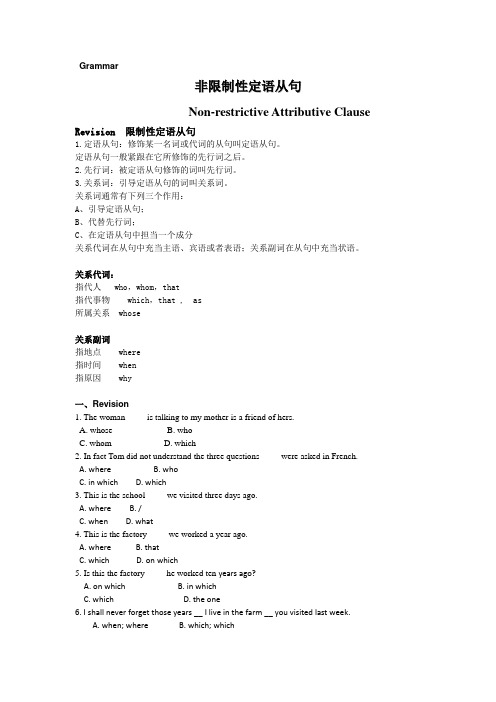
Grammar非限制性定语从句Non-restrictive Attributive Clause Revision 限制性定语从句1.定语从句:修饰某一名词或代词的从句叫定语从句。
定语从句一般紧跟在它所修饰的先行词之后。
2.先行词:被定语从句修饰的词叫先行词。
3.关系词:引导定语从句的词叫关系词。
关系词通常有下列三个作用:A、引导定语从句;B、代替先行词;C、在定语从句中担当一个成分关系代词在从句中充当主语、宾语或者表语;关系副词在从句中充当状语。
关系代词:指代人 who,whom,that指代事物 which,that , as所属关系whose关系副词指地点 where指时间 when指原因 why一、Revision1. The woman ____ is talking to my mother is a friend of hers.A. whoseB. whoC. whomD. which2. In fact Tom did not understand the three questions ____ were asked in French.A. whereB. whoC. in whichD. which3. This is the school ____ we visited three days ago.A. whereB. /C. whenD. what4. This is the factory ____ we worked a year ago.A. whereB. thatC. whichD. on which5. Is this the factory ____ he worked ten years ago?A. on whichB. in whichC. whichD. the one6. I shall never forget those years __ I live in the farm __ you visited last week.A. when; whereB. which; whichC. when; whichD. which; where二. 使用适当的关系词填空1. This is the boy ______ mother is a famous musician. 【whose】2. We don’t know the number of people ________ lost their homes in the 1906 earthquake. 【who / that 】3. The house __________ they built in 1987 stayed up in the earthquake. 【which /that】4. I’ll never forget the day _____ (=___ which ) I joined the football club.【when on 】5. I visited the house _____ (=__ which) Lu xun once lived. 【where 、in】6. This was the reason _____(=___ which) he got worried .【why、for 】观察对比1. Professor Wang has a son who works in Beijing.王教授有个在北京工作的儿子。
人教版高中英语选修6 Unit5 Using Language 精品教案

A handsomegave birth to
boyswallowedThe youngest girl
pregnant
Paragraph 4 coin
You and your ______one drop a ____ into the clear, blue water to ________ your love will be as _____ and _______ as the lake.
Changbaishan
Tianchi
story
coin
TheLakeofHeaven
in its four seasons
Spring summer autumn winter
Step 6 Homework
Surf the Internet to find more information about theLakeofHeaven.
The story of the father of Manchu people.
Step 5 Discussion
If you were a tourist guide(导游), how would you introduce the Lake of Heaven in Changbaishan to the tourists?
A place kept in its natural state for people to enjoy. The largest one inChina.
What is the most popular tourist attraction in the reserve?
Tianchi, or theLakeofHeaven.
选修六unit5语法教案

高二选修6 Unit 5 Grammar教案预习学案1. Review the usage of –ing form below. Examine the sentences and discuss in what way the structures similar to each other and in what way they are different.1)Looking carefully at the ground, I made my way to the edge of the crater.2)Having experienced quite a few earthquakes in Hawaii already, I didn’t take much notice.区别:探究学案-ing 形式的用法1)–ing 形式作状语1 Walking along the street, I met Mary.= While I was walking along the street, I met Mary.(时间状语从句)在街上走的时候,我遇到了玛丽。
2 Being tired, I stopped to take a rest.=Because I was tired, I stopped to take a rest. (原因状语从句)因为疲倦,我停下来休息。
3 Turning to the left, you will find the school.= If you turn to the left, you will find the school.(条件状语从句)向左走,你就会找到那个学校。
4 Knowing where I live, he never come to see me .= Though he knows where I live, he never comes to see me. (让步状语从句)尽管他知道我的住处,但从不来看我。
英语选修6人教版:精品教案Unit 5 Period Two Learning about Language(新人教版必修6)

Period Two Learning about Language现在分词(v.-ing)作状语v.-ing形式或v.-ing短语作状语往往修饰谓语动词表示的动作,相当于相应的状语从句或并列句。
1.表示时间,作时间状语,相当于时间状语从句。
Walking along the street,I met my old classmate.(=While I was walking along the street,I met my old classmate.)我在街上走的时候碰到了老同学。
Turning on the light=(When he turned on the light),he was surprised to see his son lyi ng on the floor.他打开灯,惊讶地看见儿子躺在地上。
Entering the office(=As soon as I entered the office),I picked up the telephone and called Bob.我一走进办公室,就拿起听筒给鲍勃打电话。
when/while+动词的-ing形式强调其表示的动作和谓语动词动作同时发生。
Look out for cars when(you are) crossing the street.过街时注意车辆。
Don’t reach sideways while(you are) standing on a ladder.站在梯子上时,不要侧着身子伸手去拿东西。
2.表示原因,作原因状语,相当于原因状语从句。
Being too young(=As he was too young),he couldn’t join the army.因为太年幼,他不能参军。
Not knowing how to get there(=As I did not know how to get there),I had to ask the way.因为不知道如何到那里,我只得问路。
人教版高中英语选修6 Unit5 Grammar名师教学设计
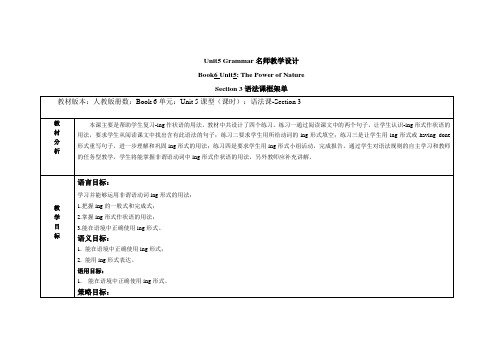
任务型教学是指教师通过引导语言学习者在课堂上完成任务来进行的教学。在本节课的教学活动中,教师围绕非谓语动词,设计出具体的、可操作的任务,学生通过表达和沟通的语言活动形式来完成任务,以达到学习和掌握语言的目的。
1.复习巩固不规则动词的ing形式构成和认识ing形式的句法功能
2.通过阅读对话引起学生学习语法的兴趣和对语法定义的思考。
1.评价学生是否掌握不规则动词的ing形式的构成
2.通过对学生的询问了解学生是否了解ing形式的用法。
DELC
2获取新知识
Step 2 Introduction and presentation(引入和呈现)
教
学
目
标
语言目标:
学习并能够运用非谓语动词ing形式的用法:
1.把握ing的一般式和完成式;
2.掌握ing形式作状语的用法;
3.能在语境中正确使用ing形式。
语义目标:
1.能在语境中正确使用ing形式;
2.能用ing形式表达。
语用目标:
1.能在语境中正确使用ing形式。
策略目标:
1.能通过自主学习观察语法规则,并进行总结归纳一般规律;
建
议
教
法
(一)功能法(The Functional Approach)又被称为语义—意念法(The Semantic Notional Approach)
功能法是以语言功能项目为纲,培养交际能力的一种教学方法体系。通过接触、模仿范例练习和自由表达思想三个步骤来组织教学。本节语法课即通过呈现句子导入感知ing形式的用法,再通过语法规则的学整个教学活动的。
高二英语选修六_Unit5_Grammar名师教学设计

Unit5 Grammar名师教学设计Book6 Unit5: The Power of Nature Section 3语法课框架单1/ 112/ 11Section 3语法课教学设计3/ 114/ 11DEL C3 深度加工知识Step 3Application(运用)1.Change the following sentences into the -ing form. Put the verbs intothe correct forms.(1)When Rose woke up in the middle of the night,she saw her roomwas as bright as day.(2)After we had stopped the car,we found ourselves trapped in thickfog and couldn't see clearly ahead.(3)Because I had spent all night reading the documents,I was verytired the next day.(4)As the child had never seen a rainbow before,he was very excited.Suggested answers:(1)Waking up in the middle of the night,Rose saw her room was asbright as day.(2)Having stopped the car,we found ourselves trapped in thick fog andcouldn't see clearly ahead.(3)Having spent all night reading the documents,I was very tired thenext day.(4)Having never seen a rainbow before,the child was very excited.2.Do Exercise 4 in Discovering useful structures on Page 37.First ask students to do the exercises individually and then let themdiscuss and check their answers with their partners,and finally give themthe correct answers and deal with any problems they might meet.1.在具体语境中运用ing形式作状语1.学生是否能在具体语境中掌握ing形式的用法5/ 11Exercises请用括号里所给动词的适当形式填空:1. _____ (live) in a southern city of China, I have never seen such a wonderful snow view.2. _____ (not grow) up yet, you’re not allowed to enter the bars.3. _____ (encourage) by the director, the actors performed wonderfully in the play.4. _____ (Know) all this, they made me pay for the damage.5. The students are sitting in the reading-room, _____ (read) all kinds of books. Key:1. Living2. Not having grown3. Encouraged4. Knowing5. reading二、单项选择1.The great hall was crowded with many people, _____ many children _____on their parents’ laps.A. including; seatedB. including; seatingC. included; satD. included; sitting2. _____ for a long time, most of the crops in this area died from lacking water.A. Being no rainB. There was no rainC. To be no rainD. There being no rain3.His letter, _____ to the wrong number, reached me late.4.A. having been addressed B. to have addressed5.C. to have been addressed D. being addressed4."You can't catch me" Janet shouted, ______away. (NMET2005全国卷3)A. runB. runningC. to runD. ran5.More and more people are signing up for Yoga classes nowadays, ______ advantage of the healthy and relaxation benefits. (NMET2005上海卷)6/ 11A. takingB. takenC. having takenD. having been taken6.______ in the queue for half an hour, Tom suddenly realized that he had left his wallet at home. (NMET2004北京卷)A. To waitB. Have waitedC. Having waitedD. To have waited答案1.A。
外研版高中英语选修6Module5_语法复习课_公开课教学设计

Module5 语法复习课公开课教学设计1教学目标1. 掌握if虚拟语气的三种基本结构;2. 利用所提供的语境用三种形式完成相应的学习任务;3. 能够在特殊情况中准确且灵活的使用if虚拟语气;2学情分析if虚拟语气是高考英语中的常见考点。
这节课是针对高三第一轮复习并围绕历年高考考点对if虚拟语气知识的再次讲解和梳理。
学生对此基本知识掌握一般,且一些重要的知识点已经遗忘。
希望通过此节课的训练达到既定的教学目标。
3重点难点1. 熟练的掌握if虚拟语气的三种基本结构;2. 应用所学规则分析句子,并采用适当的虚拟形式;3. 较为复杂情况下if虚拟语气的正确使用;4教学过程4.1第一学时4.1.1教学活动活动1【导入】知识回顾欣赏英文歌曲《If I were a boy》If I were a boyI think that I’d understandHow it feels to love a girlI swear I’d be a better manI’d listen to herCause I know how it hurts注意歌词中if虚拟语气结构的使用。
活动2【活动】应用检测A.基础闯关:小组活动—根据if虚拟的三种基本结构正确的完成句子Gift 1--If I __________(be)a bird, I ______________________________________ If I __________ (know) the answer to the question, I would tell you.Gift 2--If I _______(be)a millionaire, I ________________I am not tired. If I were tired, I _________ ( not have ) a rest.Gift 3--If Tom__________( not miss) the last bus, he _______________(not be) late for workIf you had taken my advice, you _________ (not fail) in the exam..Gift 4--If Tom _____________ (not be)late for work, he _______________(not be) fired.I didn't know her address. If I ________ (know)it, I ________ (send) a letter to her. Gift 5--If we ________________(not have) homework tomorrow, I would________ If there ______ (be) no electricity in the future, our life ________ (change) a lot.Gift 6--If I ______/________/ _______(go) to Mars, I _______(find) the signs of life on Mars.If I _______ (go) abroad, I would go to America.活动3【讲授】应用检测通过完成句子进一步巩固if虚拟语气的三种基本结构,为下面的学习任务做铺垫。
人教新课标高中英语选修六Unit5GrammarandUsefulStructures教案
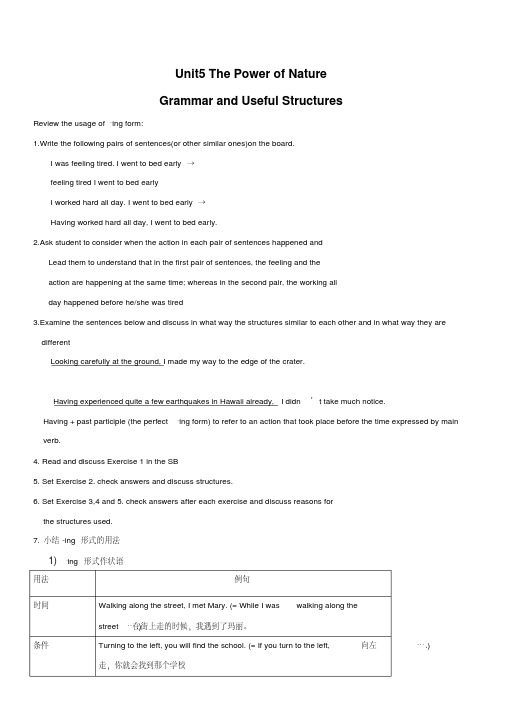
Unit5 The Power of NatureGrammar and Useful StructuresReview the usage of –ing form:1.Write the following pairs of sentences(or other similar ones)on the board.I was feeling tired. I went to bed early→feeling tired I went to bed earlyI worked hard all day. I went to bed early→Having worked hard all day, I went to bed early.2.Ask student to consider when the action in each pair of sentences happened andLead them to understand that in the first pair of sentences, the feeling and theaction are happening at the same time; whereas in the second pair, the working allday happened before he/she was tired3.Examine the sentences below and discuss in what way the structures similar to each other and in what way they aredifferentLooking carefully at the ground, I made my way to the edge of the crater.Having experienced quite a few earthquakes in Hawaii already, I didn’t take much notice.Having + past participle (the perfect –ing form) to refer to an action that took place before the time expressed by main verb.4. Read and discuss Exercise 1 in the SB5. Set Exercise 2. check answers and discuss structures.6. Set Exercise 3,4 and 5. check answers after each exercise and discuss reasons forthe structures used.7. 小结-ing 形式的用法1)–ing 形式作状语用法例句时间Walking along the street, I met Mary. (= While I was walking along the在街上走的时候,我遇到了玛丽。
- 1、下载文档前请自行甄别文档内容的完整性,平台不提供额外的编辑、内容补充、找答案等附加服务。
- 2、"仅部分预览"的文档,不可在线预览部分如存在完整性等问题,可反馈申请退款(可完整预览的文档不适用该条件!)。
- 3、如文档侵犯您的权益,请联系客服反馈,我们会尽快为您处理(人工客服工作时间:9:00-18:30)。
高二选修6 Unit 5 Grammar教案
引标:
1. Review the usage of –ing form below. Examine the sentences and discuss in what way the structures similar to each other and in what way they are different.
示标:
1)Looking carefully at the ground, I made my way to the edge of the crater.
2)Having experienced quite a few earthquakes in Hawaii already, I didn’t take much notice.
区别:
学标:
-ing 形式的用法
1)–ing 形式作状语
①Walking along the street, I met Mary.
= While I was walking along the street, I met Mary.(时间状语从句)
在街上走的时候,我遇到了玛丽。
②Being tired, I stopped to take a rest.
=Because I was tired, I stopped to take a rest. (原因状语从句)
因为疲倦,我停下来休息。
③Turning to the left, you will find the school.
= If you turn to the left, you will find the school.(条件状语从句)
向左走,你就会找到那个学校。
④Knowing where I live, he never come to see me .
= Though he knows where I live, he never comes to see me. (让步状语从句)
尽管他知道我的住处,但从不来看我。
2)–ing形式的完成式
Having +p.p. …, 主语+谓语
(Having been) +p.p. …, 主语+谓语
–ing形式的完成式所表示的时间在谓语动词之前表示被动可直接用过去分词
⑤Having finished my work, I went home.
= After I had finished my work, I went home。
工作做完只后,我就回家了。
⑥(Having been) written in haste, the book has some faults. 这本书因仓促写成,所以有些缺憾。
3)使用- ing形式需注意的几个问题。
分词(短语) 作状语时, 其逻辑主语必须与句子的主语一致。
如果不一致,必须用独立主格结构来表示,也就是在分词前面加上它的逻辑主语。
My wife had a long talk with Sally, explaining why she didn’t want the
children to play together.
我妻子与莎莉谈了很长时间, 解释她为什么不想让孩子们在一起玩。
(现在分词explaining是句子主语my wife做的动作,它们之间是主动关系, 即explaining的逻辑主语,就是句子的主语my wife 。
) The train having gone, we had to wait another day.(the train逻辑主语+ having gone 即为独立主格结构)
分词短语做状语时,前面可以加上连词或介词,但是分词短语和句子之间不能用并列连词(如but,and),因为并列连词接的是两个并列成分,而分词短语只是全句的一个状语部分,分词和主句之间可用逗号。
例如:
误: Having been told many times, but he still couldn’t understand it. 正: He was told many times, but he still couldn’t understand it.
或Having been told many times, he still couldn’t understand it.
-ing的一般式和完成式现在分词都可以表示先后接连发生的动作。
在可能引起误解的场合应该用完成式现在分词表示先发生的动作。
例如:
⑦Opening the drawer,he took out his wallet.
=He opened the drawer and took out his wallet.
他打开抽屉,拿出钱包。
⑧Coming into the room, he put down his bag.
=He came into the room and put down his bag.
他走进房间,放下提包。
⑨Having brushed his teeth, Mr. Brown came downstairs for breakfast.
=Brushing his teeth, Mr. Brown came downstairs for breakfast.
分词的否定形式是在分词短语前面加上not, never等否定词构成。
Not fearing the fire, the child touched and got a finger burnt.
小孩儿不知道怕火,用手去摸,把手指烫了。
Not knowing how to find the subway, I asked a policeman for help.
我不知怎样找到地铁,就去找警察帮忙。
珍标:
I. 每空填一词,使该句与所给句子的意思相同。
1. Because he was ill, he didn’t go to school.
Being ill, he didn’t go to school.
2. When she was walking along the street one day, she met an old friend of hers.
Walking along the street one day, she met an old friend of hers.
3. If it is sunny, we’ll go for a picnic tomorrow.
Its being sunny, we’ll go for a picnic tomorrow.
4. After she had finished her homework, the little girl began to watch TV.
Having finished her homework, the little girl began to watch TV.
5. Because they had been warned by the teacher, they didn’t make such mistakes.
Having been warned by the teacher, they didn’t make such mistakes.
6. As it was a holiday, all the shops were shut.
It being a holiday, all the shops
were shut.
7. If I had been given a longer time, I could have done it better than planned.
Having been given a longer time, I could have done it better than planned.
8. After I got home, I found my books missing.
Getting home, I found my books missing.
9. When he was still a small boy, he went to France with his father.
Being ill, he went to France with his father.
10. When autumn comes, swallows go to the south.
Autumn coming, swallows go to the south.
补标:Homework。
